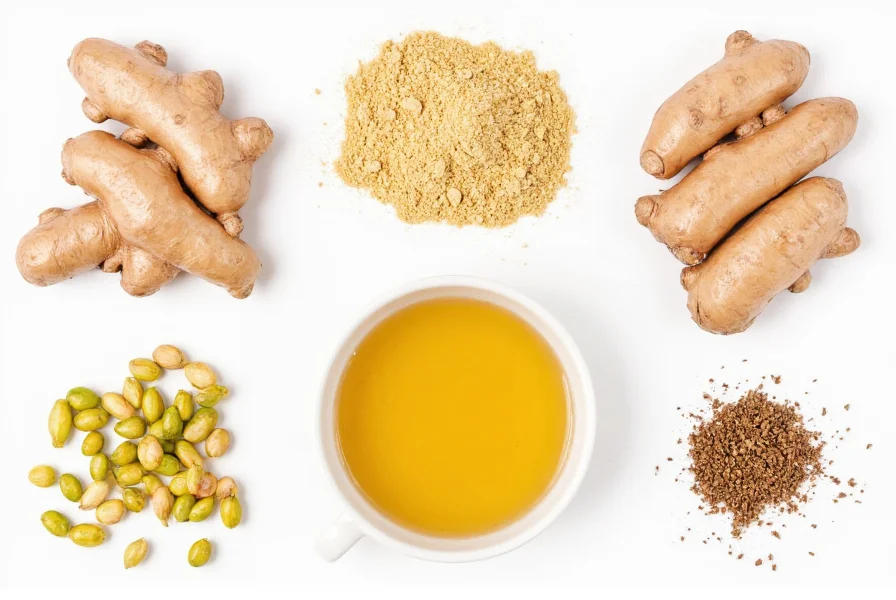Ginger (Zingiber officinale) has been used for thousands of years in traditional medicine systems across Asia and the Middle East. Modern scientific research continues to validate many of these traditional uses while uncovering new potential applications for this versatile rhizome. Unlike many herbal remedies that lack scientific backing, ginger stands out for having substantial clinical evidence supporting its therapeutic properties.
The Science Behind Ginger's Active Compounds
Ginger's health properties primarily come from gingerol, the compound responsible for its pungent flavor and aroma. When ginger is dried or cooked, gingerol transforms into shogaol and zingerone, which also contribute to its medicinal effects. These compounds work through multiple biological pathways:
- Modulating inflammatory cytokines
- Interacting with serotonin receptors to reduce nausea
- Enhancing gastric motility and digestive enzyme production
- Providing antioxidant protection against free radicals
A 2022 meta-analysis published in Nutrients confirmed that ginger supplementation significantly reduced markers of inflammation including C-reactive protein and interleukin-6 across multiple clinical trials. This anti-inflammatory action forms the foundation for many of ginger's health applications.

Top Evidence-Based Health Benefits of Ginger
Digestive Health Improvement
Ginger stimulates saliva, bile, and gastric enzyme production, accelerating gastric emptying. A double-blind study in the European Journal of Gastroenterology & Hepatology found that 1.2g of ginger powder taken before meals reduced symptoms of functional dyspepsia by 25% compared to placebo. For those experiencing occasional indigestion, incorporating fresh ginger into meals may provide natural relief without pharmaceutical side effects.
Nausea and Vomiting Relief
Ginger's effectiveness for nausea relief is one of its best-documented benefits. Research shows ginger works particularly well for:
- Morning sickness during pregnancy (studies show 1g daily reduces symptoms)
- Post-operative nausea
- Chemotherapy-induced nausea
- Motion sickness
Unlike many anti-nausea medications, ginger typically causes no drowsiness or other significant side effects, making it a preferred option for many patients.
Inflammation Reduction for Joint Health
Multiple studies demonstrate ginger's potential for managing osteoarthritis symptoms. A randomized controlled trial published in Arthritis & Rheumatism found that participants taking standardized ginger extract experienced significantly less pain and stiffness than the placebo group after 6 weeks. The anti-inflammatory effects appear comparable to some non-steroidal anti-inflammatory drugs (NSAIDs) but without the gastrointestinal risks associated with long-term NSAID use.
| Health Benefit | Effective Dosage | Time to Notice Effects | Research Support Level |
|---|---|---|---|
| Nausea relief | 0.5-1.5g daily | Within 30-60 minutes | ★★★★☆ (Strong) |
| Digestive support | 0.5-2g before meals | During/after meals | ★★★☆☆ (Moderate) |
| Inflammation reduction | 1-2g daily | 2-4 weeks | ★★★☆☆ (Moderate) |
| Antioxidant effects | 0.5-1g daily | Long-term use | ★★☆☆☆ (Emerging) |
Potential Cardiovascular Benefits
Emerging research suggests ginger may support heart health through several mechanisms. Studies indicate ginger can modestly reduce LDL cholesterol and triglycerides while improving blood circulation. A 2020 review in Nutrition Reviews noted that ginger supplementation was associated with approximately 17 mg/dL reduction in fasting blood sugar levels among diabetic patients, which indirectly benefits cardiovascular health. While not a replacement for prescribed cardiac medications, ginger may serve as a complementary dietary component for heart health.
Antioxidant Properties
Ginger contains potent antioxidants that help combat oxidative stress throughout the body. These compounds neutralize free radicals that contribute to chronic disease development and aging processes. Research published in Oxidative Medicine and Cellular Longevity demonstrated that ginger extract significantly increased antioxidant enzyme activity in test subjects, suggesting it may help protect against cellular damage when consumed regularly as part of a balanced diet.

How to Incorporate Ginger Into Your Diet
For maximum benefit, consider these practical ways to include ginger in your daily routine:
- Fresh ginger tea: Steep 1-2 tablespoons of freshly grated ginger in hot water for 5-10 minutes
- Culinary uses: Add grated ginger to stir-fries, soups, or salad dressings
- Smoothie booster: Include a thumb-sized piece of ginger in fruit smoothies
- Capsules or extracts: For standardized dosing, especially for therapeutic purposes
When selecting fresh ginger, look for firm, smooth rhizomes with tight skin. Avoid pieces that feel soft or have visible mold. Properly stored in the refrigerator, fresh ginger can last up to three weeks.
Important Considerations and Potential Side Effects
While generally safe for most people, ginger may cause mild side effects in some individuals:
- Heartburn or stomach upset (especially at higher doses)
- Mouth irritation when consumed raw
- Increased bleeding risk when combined with blood thinners
- Potential interactions with diabetes medications
The recommended daily limit for most adults is 4 grams of ginger. Pregnant women should consult their healthcare provider before using ginger medicinally, though culinary amounts are generally considered safe. Individuals scheduled for surgery should discontinue ginger supplements at least one week beforehand due to potential blood-thinning effects.
Conclusion: Ginger's Place in Modern Wellness
Ginger represents one of the best-researched natural remedies with multiple scientifically supported health benefits. While not a miracle cure, incorporating ginger into your diet provides a safe, natural way to support digestive health, reduce inflammation, and potentially improve several aspects of wellness. The growing body of research continues to validate traditional uses while uncovering new applications for this ancient remedy. For those seeking natural approaches to common health concerns, ginger offers a promising option with minimal risk when used appropriately.
Frequently Asked Questions About Ginger Benefits
What is the most effective way to consume ginger for nausea relief?
For nausea relief, consuming 0.5-1.5 grams of ginger in any form (tea, capsules, or fresh) approximately 30 minutes before potential nausea triggers appears most effective. Studies show ginger works faster when consumed as fresh root or tea compared to powdered forms, with effects typically noticeable within 30-60 minutes. The active compounds interact with serotonin receptors in the digestive tract to reduce nausea signals.
How much ginger should I take daily for inflammation reduction?
Research indicates that 1-2 grams of ginger extract or fresh ginger daily provides optimal anti-inflammatory benefits. This amount has been shown in clinical studies to reduce inflammatory markers and improve symptoms in conditions like osteoarthritis. For best results, divide the daily amount into two doses taken with meals, as consistent daily consumption over 2-4 weeks yields more significant effects than single doses.
Can ginger interact with blood pressure medications?
Ginger may have mild blood pressure-lowering effects, so it could potentially enhance the effects of antihypertensive medications. While moderate dietary consumption (up to 1 gram daily) is generally safe, individuals taking blood pressure medications should monitor their levels when starting therapeutic doses of ginger (1-2 grams daily). Consult your healthcare provider before combining ginger supplements with prescription blood pressure medications to avoid potential interactions.
Is fresh ginger more effective than powdered ginger for health benefits?
Fresh ginger contains higher levels of gingerol, the primary active compound, compared to dried ginger powder. However, dried ginger contains more shogaol, which forms when gingerol dehydrates and has its own therapeutic properties. For nausea relief, fresh ginger appears slightly more effective, while powdered ginger may offer stronger anti-inflammatory effects. Both forms provide significant health benefits, so personal preference and intended use should guide your choice.
How long does it take to experience ginger's digestive benefits?
Many people notice ginger's digestive effects within 15-30 minutes of consumption, particularly when taken before or during meals. For chronic digestive issues, consistent daily use over 2-4 weeks typically yields more significant improvements in symptoms like bloating, gas, and indigestion. Research shows that regular consumption enhances gastric motility and digestive enzyme production, with maximum benefits observed after several weeks of consistent use at appropriate dosages (0.5-2 grams daily).











 浙公网安备
33010002000092号
浙公网安备
33010002000092号 浙B2-20120091-4
浙B2-20120091-4